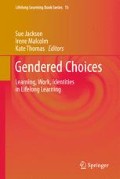Abstract
In this chapter, I will discuss the findings of a 32-month Higher Education European Social Fund research project where we set out to examine whether particular types of workplace learning opportunities (brokered by the Trade Union , UNISON ) aimed at low-paid women workers , result in changes in self-esteem, employability, take-up of training opportunities and any associated relevant cross-cutting effects of age and ethnicity . The research was conducted between February 2004 and August 2006 with a remit to include England, Wales, Scotland and Northern Ireland. I was the sole Research Fellow on the project and was guided by a Steering Group with representation from academic colleagues and from UNISON . In outlining the research journey and findings, I refer here to ‘we’ or ‘our’ as my thoughts are as a result of dialogue with these colleagues as much as they are with the research data (although any errors are my own).
Access this chapter
Tax calculation will be finalised at checkout
Purchases are for personal use only
References
Alheit, P., & Dausien, B. (2002). The double face of lifelong learning: Two analytical perspectives on a ‘silent revolution’. Studies in the Education of Adults, 34(1), 3–22.
Barton, D., Appleby, Y., Hodge, R., Tusting, K., & Ivanic, R. (2005). Relating adults’ lives and learning: Participation and engagement in different settings. London: National Research and Development Centre for Adult Literacy and Numeracy. Institute of Education.
Bates, P., Hunt, W., & Hillage, J. (2005). Learning at work: Strategies for widening adult participation in learning below Level 2 via the workplace. London: Learning and Skills Development Agency.
Crossan, B., Field, J., Gallacher, J., & Merrill, B. (2003). Understanding participation in learning for non-traditional adult learners: Learning careers and the construction of learning identities. British Journal of Sociology of Education, 24(1), 55–67.
Darvill, G. (2002). Independent evaluation report, Suffolk social services department, Ruskin college—Work-based diploma in Social Work 1999–2002. London: UNISON.
DfEE (Department for Education and Employment. Great Britain). (1998). The learning age: A renaissance for a new Britain (Summary of the Green Paper). London: HMSO.
Donaghy, P. (2001). Work based learning in Northern Ireland, Empowerment through lifelong Learning. The threat of a good example. Belfast: UNISON.
DTI (Department of Trade and Industry. Great Britain). (2004). The Employment Relations Act 2004. London: HMSO.
Edwards, R. (1993). Mature women students. London: Taylor and Francis.
Forrester, K. (1999). Ambiguous agendas: The development of ‘Employee Development Schemes’ in the 1990’s. Adult education and the labour market (V). Roskilde University, ESREA.
Forrester, K. (2002). Work-related learning and the struggle for employee commitment. Studies in the Education of Adults, 34(1), 42–55.
Forrester, K. (2004). The quiet revolution? Trade union learning and renewal strategies. Work, Employment and Society, 18(2), 413–420.
Forrester, K. (2005). Learning for revival; British trade unions and workplace learning. Studies in Continuing Education, 27(3), 257–270.
Hyde, S. (2006). Women and work: Progression through learning. Sussex: University of Sussex.
Kennedy, H. (1995). Return to learn: UNISON’s fresh approach to trade union education. London: UNISON.
Lea, M., & West, L. (1995). On biographies and institutions: changing selves, fragmentation and the struggle for meaning. In P. Alheit, A. Bron-Wojciechowska, E. Brugger, & P. Dominice (Eds.), The biographical approach in European adult education. Vienna: Verband Wiener Volksbildung. (Published for ESREA).
Learning and Skills Council. (2006). Skills in England 2005 (Vols. 1 and 2).
Leitch Review. (2006). Prosperity for all in the global economy—world class skills. London: DfES.
McGivney, V. (1999). Informal learning in the community: A trigger for change and development. Leicester: NIACE.
Merrill, B. (2005). Biographical research: Reasserting collective experience. In J. Crowther, V. Galloway, & I. Martin (Eds.), Popular education: Engaging the academy international perspectives. Leicester: NIACE.
Merrill, B., & Alheit, P. (2004). Biography and narratives: Adult returners to learning. In M. Osbourne, J. Gallacher, & B. Crossan, Widening access to lifelong learning: Issues and approaches in international research. London: Routledge.
Miskin, J. (2004) ESREA Conference. Northern College, Yorkshire.
Munro, A., & Rainbird, H. (2004). Opening doors as well as banging on tables: An assessment of UNISON/employer partnerships on learning in the UK public sector. Industrial Relations Journal, 35(5).
Munro, A., Rainbird, H., & Holly, L. (1997). Partners in workplace learning: A report on UNISON/employer learning and development programme. London: UNISON.
NIACE. (2006). The big conversation. www.niace.org.uk.
Quality Improvement Agency. (n. d.). Skills for life quality initiative. Motivation and persistence.
Trades Union Congress. (2004). Empowerment through equality. London: Congress House.
Tuckett, A. (2006). Creative workers come at a price. Times Educational Supplements.
West, L. (1996). Beyond fragments: Adults, motivation and higher education—A biographical analysis. London: Taylor and Francis.
Wood, H., & Moore S. (2005). An evaluation of the UK union learning fund— its impact on unions and employers. London: Working Lives Research Institute, London Metropolitan University.
Author information
Authors and Affiliations
Editor information
Editors and Affiliations
Rights and permissions
Copyright information
© 2011 Springer Science+Business Media B.V.
About this chapter
Cite this chapter
Hyde, S. (2011). Where is Gender Within the Workplace Learning Agenda?. In: Jackson, S., Malcolm, I., Thomas, K. (eds) Gendered Choices. Lifelong Learning Book Series, vol 15. Springer, Dordrecht. https://doi.org/10.1007/978-94-007-0647-7_10
Download citation
DOI: https://doi.org/10.1007/978-94-007-0647-7_10
Published:
Publisher Name: Springer, Dordrecht
Print ISBN: 978-94-007-0646-0
Online ISBN: 978-94-007-0647-7
eBook Packages: Humanities, Social Sciences and LawEducation (R0)

